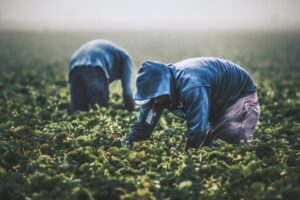Agriculture is a cultural lifeblood of Idaho, and has been a way of life for generations of Idahoans. Through our Farm Feature series, ICL has traditionally highlighted farmers in southern Idaho who are using sustainable practices that are good for their land and water, pocketbooks, customers, and the planet. For this feature, however, ICL takes a deeper look at one of the organizations promoting safer, healthier practices across the entirety of Idaho’s agriculture industry by looking out for the very backbone of the industry: the farmworker.
Idaho’s agriculture industry employs an average of 61,828 workers annually, according to the University of Idaho, and at least 81% of this agricultural workforce is made up of migrants. Thanks to their labor, Idaho enjoys a bounty of food; the Idaho State Department of Agriculture (ISDA) reported that if Idahoans were to eat the entirety of products produced in the state, each resident would have to consume 137 slices of bread, 38 potatoes, 3 pounds of sugar, 2 pounds of cheese, 2 pounds of beef, and 1 cup of beans daily.
However, for supporting an industry worth billions of dollars, farmworkers—especially migrant farmworkers—often get the short end of the stick in terms of wages, hours, and general worker protections. Of all the concerns facing the farmworker community, however, there’s one issue of particular gravity, a threat to public and environmental health alike: pesticides.

ICL spoke with Irene Ruiz, the Executive Director of Idaho Organization of Resource Councils (IORC), about what’s being done to support our farmworker community in regard to pesticides. IORC is a state-wide organization that “empowers people to improve the well-being of their communities, sustain family farms and ranches, transform local food systems, promote clean energy, and advocate for responsible stewardship of Idaho’s natural resources.” This includes grassroots advocacy work in addition to directly providing resources to farmworker communities.
“We give out a lot of pesticide poisoning information. Our goal is to provide resources that can help prevent harm, so that [farmworkers] can better care for themselves. We educate people so they have more knowledge as to what pesticides can do to someone’s body, and we do a lot of grassroots advocacy and organizing around that,” Ruiz explained.
In the last few months, both ICL and IORC have been alarmed by pesticide bills put forward by the Idaho legislature that would grant sweeping immunity to manufacturers, so long as the Environmental Protection Agency (EPA) has approved their product for use.
In recent years, a number of studies have indicated links between exposure to certain commonly used pesticides and health ailments including cancer, Parkinson’s disease, harm to brain development, and other negative effects. Many other countries ban the use of certain pesticides that are approved for use in the United States, and the EPA has been criticized for their unwillingness to ban pesticides, even after scientists have provided credible evidence linking pesticides to serious health concerns.

We asked Ruiz to talk about this intersection of environmental justice and public health, and what these sorts of immunity-granting bills might mean for the overall welfare of farmworkers.
“My biggest concern is that protections will be taken away for people who get hurt or harmed. People should be able to have somewhere to go to where they can get compensation. They deserve to be heard and listened to.” Ruiz responded. “Where do they go if they do get harmed? Who is responsible?”
The first pesticide bill put forward this year was killed in the Senate on a 19-15 vote. A second bill was promptly introduced and struck down. Now, a third iteration—introduced one month after the deadline for introducing new bills—is up for consideration. Like its predecessors, this bill would ultimately eliminate the ability for Idaho farmers, farmworkers, landscapers, neighbors, or others to participate in class action lawsuits against pesticide manufacturers. Instead, Idaho taxpayers, insurance companies, and individuals would be responsible for covering the costs associated with these damages.
“If you’re a manufacturer, why aren’t you being more responsible with the product you sell? We’ll see more rules and regulations that will be taken away if this goes through.” Ruiz reflected.
This alarming affront on protections happens at a time when it’s becoming all the more important to support the farmworkers who help to put food in our stores and on our plates. Ruiz explained that the issue of pesticides, much like other hazards to workers in the agricultural world, will only become more detrimental with climate change.
“People need to be aware that climate change affects farmworkers at a greater rate than other people. We’re thinking about heat, smoke, and pesticides. As it becomes hotter, more pesticides are used, because they dissipate faster in the heat,” Ruiz explained to us.
“Without educating people on how farmworkers are getting affected by climate change, it will be that much harder to protect farmworkers, now and in the future. There needs to be more done and more advocacy around that issue. A lot of groups are doing that, but not a lot in Idaho.”
We asked Ruiz how concerned citizens can stay up to date on pesticide issues. In addition to keeping up with the IORC, Ruiz mentioned that the Northwest Center for Alternatives to Pesticides (NCAP) is a wide-reaching resource for all things pesticides in the Northwest. NCAP advocates for non-toxic pest and weed solutions for “the health of people and the environment.”
Most importantly, however, concerned citizens should take this moment to speak up against bills like this before they have the chance to become law. Speak up for our farmworkers today. Tell your legislators to Vote No on the Senate Bill 1432.
